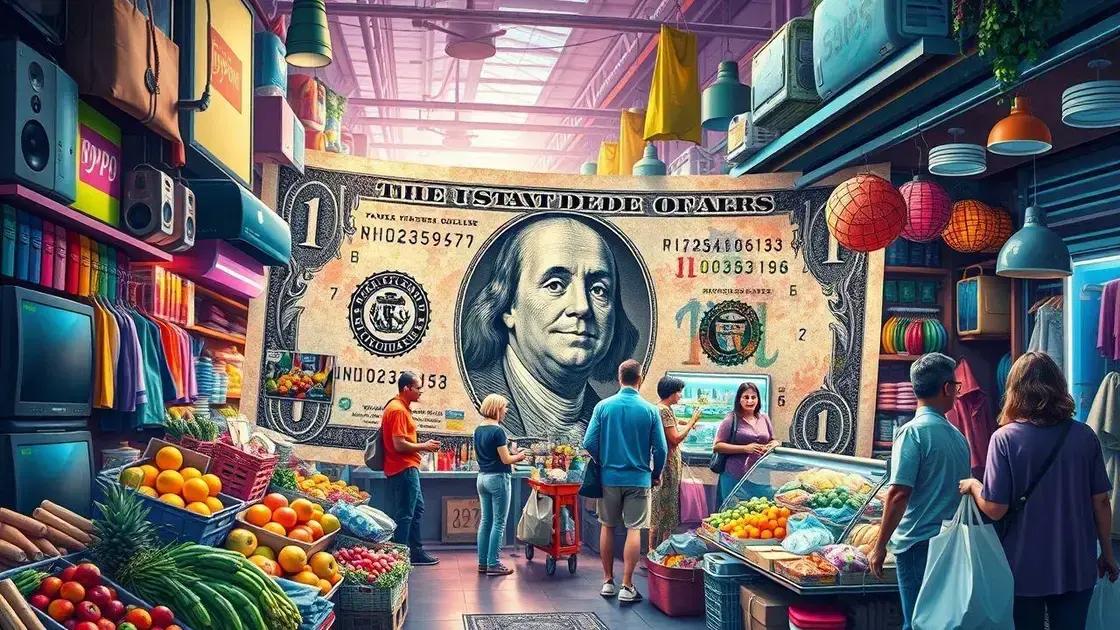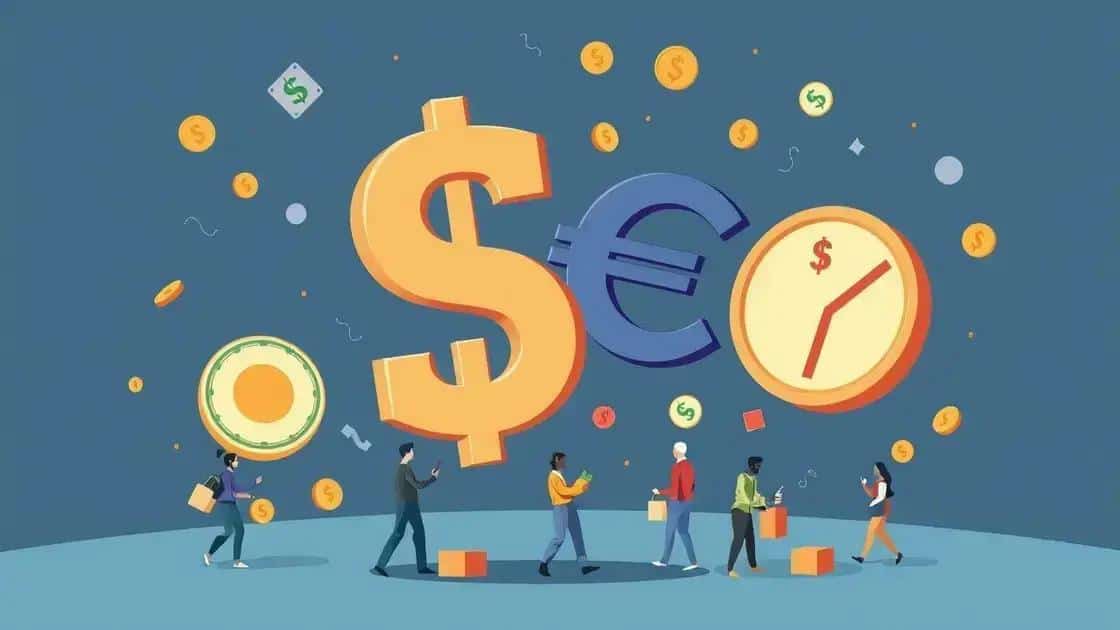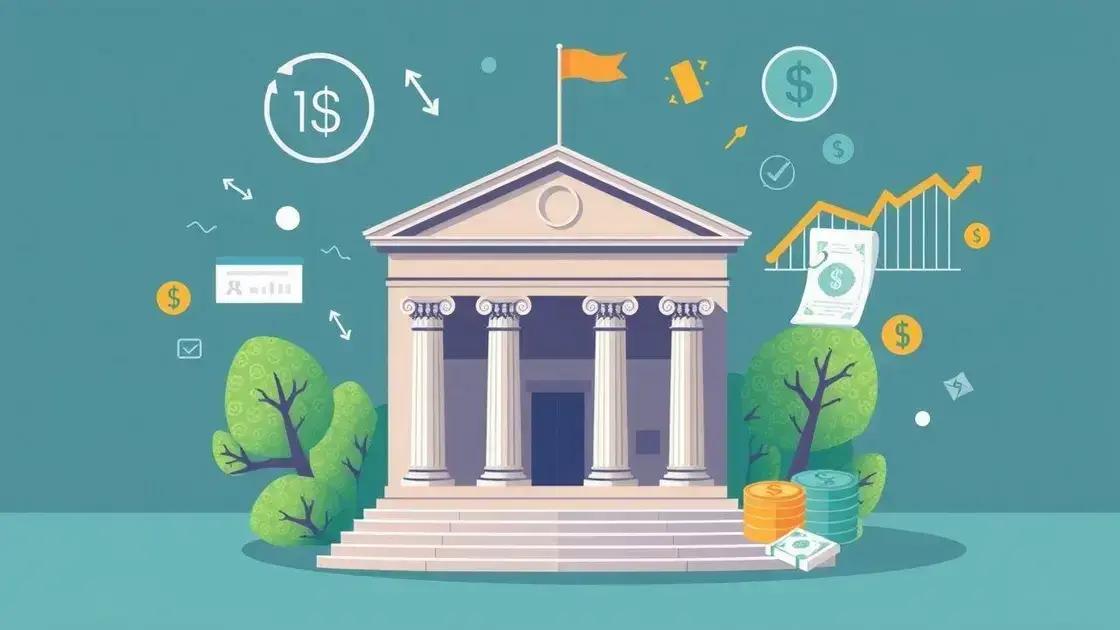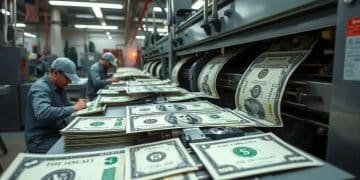How the US money magically creates value

The US money system relies on fiat currency, backed by government trust, which allows for effective monetary policy and influences economic factors like inflation and growth.
How the US money magically creates value can seem like a mystery. Have you ever wondered how dollars appear and affect your daily life? Let’s dive into this fascinating topic.
Understanding the US dollar’s role
Understanding the role of the US dollar can be quite fascinating. This currency is not just a piece of paper; it symbolizes a complex system that influences the global economy.
What is the US dollar?
The US dollar is more than just a currency; it’s a key player on the world stage. Used in international transactions and as a benchmark for other currencies, it provides stability and confidence in trade.
Many countries hold US dollars in their reserves, which further solidifies its importance. This leads to a unique situation where the value of the dollar can affect economies around the globe.
Why is the dollar important?
The importance of the dollar can be summarized in a few key points:
- Global Reserve Currency: The US dollar is the most widely held currency in the world.
- Influences Trade: Countries often trade using the dollar, making it essential for international transactions.
- Economic Stability: A strong dollar often reflects a stable US economy, attracting foreign investment.
The interconnectedness of global markets means that when the dollar fluctuates, so do economies everywhere. This makes understanding its role crucial for individuals and businesses alike.
Many ask how the dollar maintains its strength. Factors include interest rates set by the Federal Reserve and monetary policy that influences inflation and economic growth. The relationship between these elements shapes the dollar’s value constantly.
Ultimately, being aware of the US dollar’s role helps individuals make informed financial decisions. Whether it’s investing, saving, or spending, the dollar’s value can significantly impact our personal finances.
The magic of fiat currency

The magic of fiat currency can be truly captivating. Unlike other forms of money, fiat currency has no intrinsic value; instead, its worth comes from the trust and confidence of the people who use it.
Understanding Fiat Currency
To grasp how fiat currency works, it’s important to recognize that it is backed by the government, not by physical commodities like gold or silver. When a government issues currency, they promise that it will be accepted for goods and services. This promise creates a belief system that fuels its value.
Unlike traditional currencies, fiat money allows governments to control the supply, influencing economic stability. This control helps nations respond to economic challenges, such as inflation and recession, by adjusting the money supply as needed.
Benefits of Fiat Currency
Fiat currency has several advantages, including:
- Flexibility: Governments can adjust the money supply to suit economic needs.
- Stability: Fiat systems can help stabilize the economy during financial crises.
- Convenience: It simplifies transactions without needing physical commodities.
The connection people have with fiat currency often exceeds its tangible worth. It’s fascinating how the value of dollars, euros, and yen can fluctuate based on collective beliefs and economic policies. As economies grow and adapt, so does their currency.
Moreover, the concept of trust plays an essential role. When users believe in the stability and fairness of their currency, they are more likely to use it confidently. In this way, the magic of fiat currency is not merely about its printed form but about the faith and community it cultivates in society.
How money creation impacts the economy
Understanding how money creation impacts the economy is crucial. When a government or central bank generates new money, it can influence various economic elements, from inflation to employment rates.
The Role of Central Banks
Central banks, like the Federal Reserve in the US, play a significant role in creating money. They can increase the money supply through several methods, such as setting interest rates or purchasing government bonds. When money is injected into the economy, it often stimulates spending and investment, which can boost economic growth.
However, this increase in money can also lead to inflation if too much money chases too few goods. This is why central banks must tread carefully when managing the money supply.
Inflation and Its Effects
Inflation is a critical factor resulting from money creation. It describes a general rise in prices, which can erode purchasing power. It is essential to understand how money creation leads to:
- Increased Prices: When the supply of money grows, prices tend to rise as demand increases.
- Impact on Savings: Inflation can decrease the value of savings if interest rates do not keep up.
- Wage Adjustments: Workers may demand higher wages to keep up with rising costs.
Growing economies can accommodate some inflation, but excessive inflation can destabilize an economy and cause hardships for consumers. In contrast, deflation, caused by a shrinking money supply, can lead to decreased spending, further economic stagnation, and rising unemployment.
The balancing act of money creation is essential for economic health. It requires careful monitoring and adjustments to maintain a stable value of money while promoting growth and employment. Having a stable currency is vital for fostering trust in economic systems, allowing people and businesses to plan for the future.
Exploring monetary policy effects

Exploring the effects of monetary policy is vital for understanding how economies function. Monetary policy includes the actions taken by a central bank to manage the money supply and interest rates, which can significantly influence economic growth.
Types of Monetary Policy
There are two main types of monetary policy: expansionary and contractionary. Each serves different purposes.
Expansionary monetary policy aims to stimulate the economy by increasing the money supply. This can be done by lowering interest rates, making borrowing cheaper. When individuals and businesses find loans more affordable, they tend to spend more, boosting economic activity.
On the other hand, contractionary monetary policy seeks to reduce the money supply to combat inflation. By raising interest rates, borrowing becomes more expensive, which can cool down an overheated economy. This careful balancing act can help maintain price stability.
Impact on Inflation and Employment
The effects of monetary policy are widely felt across various economic sectors, including:
- Inflation Control: Monitoring and adjusting the money supply can help keep inflation in check.
- Employment Levels: Effective monetary policy can lead to job growth by fostering a more robust economy.
- Consumer Confidence: Changes in interest rates can influence consumer spending habits, impacting overall economic activity.
As monetary policy adjusts, so does the behavior of individuals and businesses. For instance, when rates are low, people might be more inclined to buy homes. Conversely, high rates can lead to cautious spending, driving economic slowdowns.
Understanding the nuances of how monetary policy is crafted and implemented helps individuals grasp its far-reaching implications. By recognizing these effects, one can better navigate personal financial decisions in response to economic shifts.
FAQ – Frequently Asked Questions about US Money and Economy
What is fiat currency and why is it important?
Fiat currency is money without intrinsic value, backed by government trust. It’s important because it allows for flexibility in economic policies and transactions.
How does money creation affect inflation?
When new money is created, it can lead to inflation if too much money chases too few goods, driving prices up.
What role does monetary policy play in the economy?
Monetary policy, through measures like adjusting interest rates, manages the money supply to influence economic growth and stability.
How can individuals protect themselves from inflation?
Individuals can protect themselves from inflation by investing in assets that typically rise in value, such as stocks, real estate, or inflation-indexed bonds.






